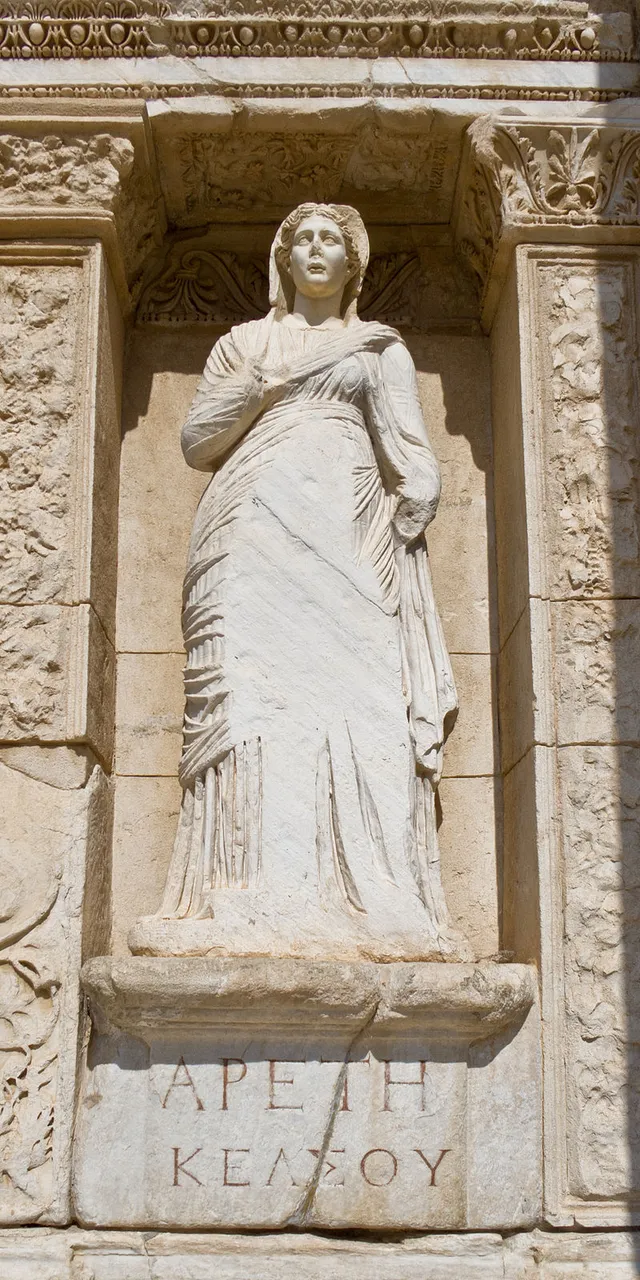Oops, I am running out of day and need to publish to get the post a day badge. I was writing about Greek Philosophy. The picture from Wikicommons shows a bust that represents virtue.

Being and Non-Being
Ancient philosophers were interested in a variety of philosophical concepts such as the distinction between being, non-being and becoming.
Clearly, there is stuff in this universe of ours. How did this stuff come into being? Some stuff changes. Other stuff seems to remain. What is permanent in this world and what is in a state of flux?
The question of being and becoming is foundational to both Plato's forms and Aristotle's categories.
Multiplicity
The ancient philosophers were deeply interested in a concept called multiplicity. What is the nature of the one to the many?
What is the relation of the parts to the whole?
Sometimes the whole is worth more than the sum of the parts. Sometimes the parts are worth more than the whole. What is going on?
Pythagoras put great stock in numbers but ran aground against intractable paradoxes. Parmenides examined the paradoxes and concluded that all is one and the multiplicity is an illusion. Some call Parmenides' ideas "monism"
Many tried to explain the world through either a unity of opposites or conflicts between opposites. It is common to classify such belief systems as dualism.
Zoroastrianism spoke of a conflict between a God of Harmon and one of discord. In Chinese philosophy people explored the concept of yin and yang. Judaism has a conflict between good and evil.
Dualistic ideologies tend to get mired in paradoxes and one will find the ancient world filled with sayings that center on fundamental contradicts.
The ancients tended to assign magical qualities to numbers. Discussions of multiplicity often touched on numerology.
The Mind Body and Spirit
Ancient philosophers spent a fair amount of time contemplating about the mind, body and spirit. The mind is the medium we use for contemplation. It is natural to use the medium to explore the medium.
Notice the large number of posts on HIVE that are about HIVE.
It is common for philosophers to contemplate the nature of the mind.
If you close your eyes for a moment and look around inside your head. That thing you are looking at is your mind.
The human mind is capable of processing syllogisms (if/then statements). Your mind seems to be able to visualize things and hold memories.
Aristotle noted that man is capable of forming and and processing syllogisms. Aristotle saw this ability to engage in reasoning as a fundamental attribute that separated mankind from other animals.
Yes, computers are able to process syllogisms, but are they really capable of forming syllogisms?
Philosophy and Ethics
Socrates, Plato and Aristotle were deeply concerned with ethics.
Socrates struggled to find definitions of virtues. Plato, who claimed to see hidden forms, had four cardinal virtues: Prudence, Fortitude, Temperance and Justice.
Aristotle's development of logic allowed philosophers to build larger systems based on the discussion of virtue.
Each virtue would have two corresponding vices. The first is a lack of the virtue and the second is the virtue pushed to extremes.
Aristotle's Poetics taught that the highest form of theater was the tragedy. In this form of drama, the protagonist would suffer the consequences of a tragic flaw. The tragic flaw being a virtue pushed to excess.
Wikipedia lists the virtues discussed in Nicomachean Ethics as: Courage in the face of fear, Temperance in the face of pleasure and pain, Liberality with wealth and possessions, Magnificence with great wealth and possessions, Magnanimity with great honors, Proper ambition with normal honors, Truthfulness with self-expression, Wittiness in conversation, Friendliness in social conduct, Modesty in the face of shame or shamelessness, and Righteous indignation in the face of injury.
Different philosophers developed different lists of virtues.
Stoicism
The Stoic Philosophers combined logic and discussions of virtues to build an interesting moral basis for society.
I Need to Press Publish
The ancient world was rife with rich debates about the nature of the mind, ethics and nature. Unfortunately, i need to press the publish button and so I will cut off in the middle of this post.
